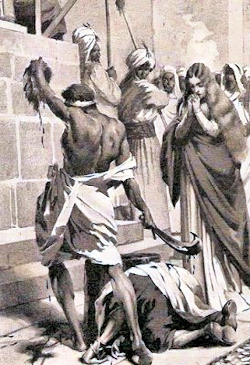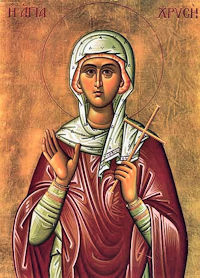Ordinary Time: July 19th
Wednesday of the Fifteenth Week of Ordinary Time
Other Commemorations: St. Aurea of Cordoba, Virgin and Martyr (RM)
» Enjoy our Liturgical Seasons series of e-books!
Historically today is the feast of the holy abbot Arsenius. Before he left the world and retired into the desert, he led an innocent and saintly life at the court of Theodosius the Great, who had entrusted him with the care of the education of his children.
It is also the feast of St. Aurea, Roman Catholic Martyr of Spain. She was born in Cordova, Spain, in the ninth century to Muslim parents. She was also the sister of Ss. Aldolphus and John, who were martyred at Cordova. Aurea became a Christian after her husband died, and took the veil at a monastery in Cuteclara, Spain, where she remained for more than twenty years.
She was ultimately denounced as a Christian by her parents, and received a martyr’s crown by beheading in 856.
According to the 1962 Missal of St. John XXIII the Extraordinary Form of the Roman Rite, today is the feast of St. Vincent de Paul, Confessor. His feast in the Ordinary Form of the Roman Rite is celebrated on September 26. .
St. Aurea of Cordoba
 St. Aurea was one of the Córdoba martyrs. The city of Córdoba had been Christian from apostolic times until the Islamic conquest came to southern Spain in the year 711.
St. Aurea was one of the Córdoba martyrs. The city of Córdoba had been Christian from apostolic times until the Islamic conquest came to southern Spain in the year 711.
Soon Córdoba became the capital of this part of the original "Islamic State", and would remain so until the 15th century.
During this whole period the Church continued to exist, but she was subject to sharia (Islamic law) which forbade public witness and imposed jizya (a special tax). Things became more complicated as Córdoba grew into a prestigious economic and cultural center in the Islamic world. Catholic churches and monasteries remained, but the population — attracted by the many opportunities in the Muslim city — began converting to Islam. Even prominent churchmen cooperated with the political regime in ways that compromised their integrity.
By 800, few remained professing Catholics. A significant portion of the population, however, conformed externally to Islamic laws and customs but tried in various ways to remain Christian privately or even secretly. Though Sharia law permitted Christians to exist, it forbade Muslims to convert to Christianity. This was regarded as the crime of apostasy, punishable by death.
The problem of "secret Christians" in Islamic Spain was especially complicated by the inevitable mixed marriages between Muslim men and Christian women. The latter were generally permitted to retain their faith, but the children of such marriages were considered Muslim by Sharia law. It is impossible to gauge the influence of these Christian mothers on their children, but it was not negligible.
Thus, by the 9th century Córdoba was institutionally and legally Muslim, and what was left of the Church was largely compliant. But this period also documents the witness of forty-eight Córdoba Martyrs. Many were Christians executed for blasphemy because, in seeking to reinvigorate the Church, they openly proclaimed Christ and denounced Islam.
But there were also apostates among them. Saint Aurea illustrates what may have been the hidden truth for many others born of mixed marriages. She was one of several children of a prominent Muslim father and a Christian mother. Her mother must have been an outstanding woman of faith who raised her children as believing Christians. When Aurea was young, two of her brothers were martyred. Sometime after this (and after her marriage and widowhood, about which nothing is known) Aurea joined her mother in seclusion in a convent outside the city.
A significant portion of the population, however, conformed externally to Islamic laws and customs but tried in various ways to remain Christian privately or even secretly.
Open Christian witness was met by further Muslim persecution in 850, and it became increasingly unsafe for Christians like Aurea, who were legally Muslim by birth in spite of growing up as Christians and personally embracing the Christian Faith. Relatives from her Muslim father's family found Aurea after twenty years of undisturbed peace in the convent and brought her before the Sharia court. To avoid being condemned for apostasy, Aurea did what many other secret Christians did to escape: she declared adherence to Islam and its prophet.
She repented, however, almost immediately after being released, and returned to practicing her Christian faith. Her Muslim relatives denounced her again, and this time she was executed on July 19, 856. We have presented Aurea as a convert even though it's possible that she was baptized a Christian at an early age. Nevertheless, she was martyred because Islamic law regarded her as a convert — an apostate — simply because of her free adherence to Jesus Christ.
—Excerpted from John Janaro, "Saint Aurea of Cordoba" Magnificat (April 2016)
Highlights and Things To Do:






